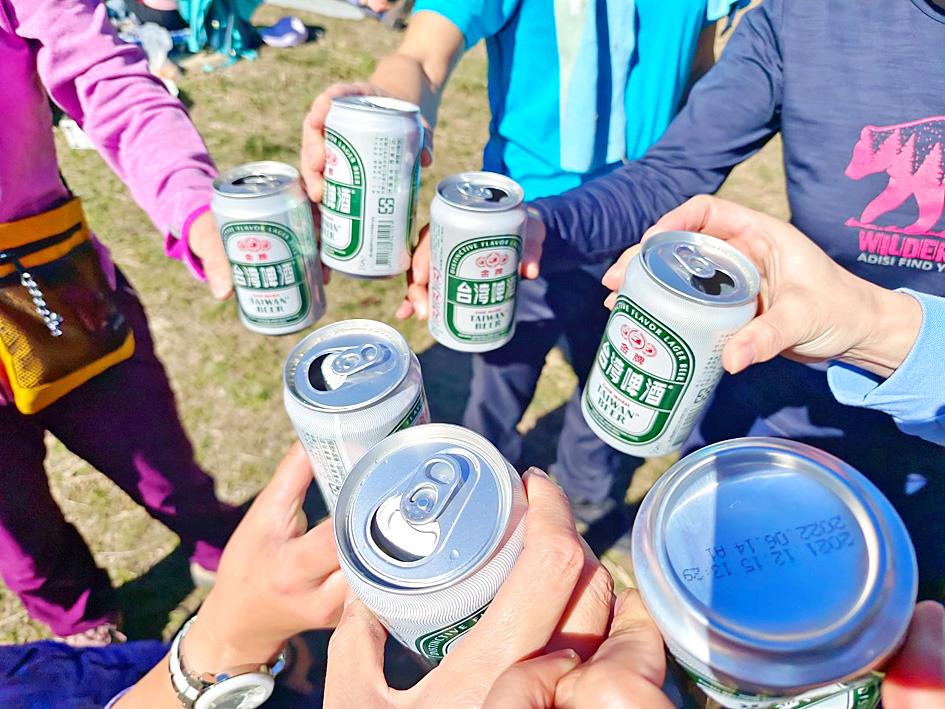The percentage of Taiwanese women who consume harmful amounts of alcohol is on the rise, particularly in the 18-to-29 age group, a study by the National Health Research Institutes (NHRI) has shown.
The gap between the number of men and women who drink alcohol is shrinking, which is likely due to societal changes, the NHRI said.
The government should amend the laws to require that the dangers of excessive alcohol consumption be made clearer on the packaging of alcoholic beverages, it said.

Photo: Huang Mei-chu, Taipei Times
The research team looked at survey data from 2014 to 2018 and found that the gender gap in alcohol consumption over the period had shrunk annually, said NHRI Center for Neuropsychiatric Research director Chen Wei-jen (陳為堅), who led the team.
The survey defined excessive alcohol consumption as more than five units of alcohol in a single session of drinking, with one unit defined as a 350ml can of beer or equivalent in alcohol content.
The team used the Alcohol Use Disorders Identification Test developed by the WHO to define harmful consumption of alcohol. The test includes 10 questions with scores of one to four points each.
People who score eight or higher are deemed to have “harmful” alcohol-consumption habits that affect personal relationships, work and other factors of their lives, Chen said.
They might also experience anxiety or depression when they do not consume alcohol, he said.
In 2014, 37.99 percent of men surveyed reported drinking harmful levels of alcohol, while only 5.3 percent reported doing so in 2018. Over the same period, the number of women surveyed who engaged in harmful drinking grew from 1.32 percent to 1.72 percent, he added.
Those in the 18-to-29 age group increased from 1.63 percent to 1.84 percent, Chen said, adding that the majority of those in that category were university educated and worked in professional occupations.
“The gender gap in alcohol consumption has been shrinking in the past few years in South Korea and Japan as well,” he said. “However, in those countries men have reduced their alcohol consumption, while women have been drinking the same amount as earlier, whereas in Taiwan women are drinking more than before.”
Chen said the decline in heavy drinking among men could be due to stricter laws against driving under the influence, while the increase in women might be due to more women working in professional occupations.
Alcoholic beverage companies have also been producing advertisements targeting women, he said.
“International companies selling alcoholic beverages have seen the potential in the Asian market and Taiwan does not have laws against advertising alcohol as it does for tobacco products,” he said.
“Alcohol is legal, but we need to be aware of the dangers of overconsumption, including alcohol poisoning, injury from falls, sexual assault and other latent dangers,” he added.

Nipah virus infection is to be officially listed as a category 5 notifiable infectious disease in Taiwan in March, while clinical treatment guidelines are being formulated, the Centers for Disease Control (CDC) said yesterday. With Nipah infections being reported in other countries and considering its relatively high fatality rate, the centers on Jan. 16 announced that it would be listed as a notifiable infectious disease to bolster the nation’s systematic early warning system and increase public awareness, the CDC said. Bangladesh reported four fatal cases last year in separate districts, with three linked to raw date palm sap consumption, CDC Epidemic Intelligence

The manufacture of the remaining 28 M1A2T Abrams tanks Taiwan purchased from the US has recently been completed, and they are expected to be delivered within the next one to two months, a source said yesterday. The Ministry of National Defense is arranging cargo ships to transport the tanks to Taiwan as soon as possible, said the source, who is familiar with the matter. The estimated arrival time ranges from late this month to early next month, the source said. The 28 Abrams tanks make up the third and final batch of a total of 108 tanks, valued at about NT$40.5 billion

Two Taiwanese prosecutors were questioned by Chinese security personnel at their hotel during a trip to China’s Henan Province this month, the Mainland Affairs Council (MAC) said yesterday. The officers had personal information on the prosecutors, including “when they were assigned to their posts, their work locations and job titles,” MAC Deputy Minister and spokesman Liang Wen-chieh (梁文傑) said. On top of asking about their agencies and positions, the officers also questioned the prosecutors about the Cross-Strait Joint Crime-Fighting and Judicial Mutual Assistance Agreement, a pact that serves as the framework for Taiwan-China cooperation on combating crime and providing judicial assistance, Liang

A group from the Taiwanese Designers in Australia association yesterday represented Taiwan at the Midsumma Pride March in Melbourne. The march, held in the St. Kilda suburb, is the city’s largest LGBTQIA+ parade and the flagship event of the annual Midsumma Festival. It attracted more than 45,000 spectators who supported the 400 groups and 10,000 marchers that participated this year, the association said. Taiwanese Designers said they organized a team to march for Taiwan this year, joining politicians, government agencies, professionals and community organizations in showing support for LGBTQIA+ people and diverse communities. As the first country in Asia to legalize same-sex